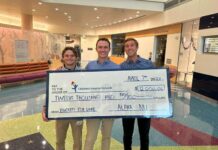Fraternal organizations teamed up to teach sexual assault recognition, prevention, and proper intervention on college campuses. The ASAE Research Foundation is sharing insights from this initiative and others as part of centennial-year research into associations’ impact on public protection, education, and the workforce and economy.
One in four undergraduate women report having experienced sexual assault or misconduct, according to an Association of American Universities study. Yet, disturbingly, fewer than a third report these incidents to authorities—even when they involve rape. Further, the rate of nonconsensual sexual contact by physical force or inability to consent has continued to rise on college campuses, which serve as home base for more than 15 million students for most of every year.
The rate is highest for undergraduate women, among whom the reported incidence rose 3 percent (to 26.4 percent) from 2015 to 2019. Among female graduate students, the rate increased 2.4 percent (to 10.8 percent). Even among male undergraduates, the incidence of nonconsensual sexual contact ticked up 1.4 percent (to 6.9 percent).
Supporting Students
Concern for the rising rate was front and center for Sigma Nu Fraternity and Zeta Tau Alpha Women’s Fraternity. Together, the organizations’ leaders forged a prevention-focused educational effort tailored to students. The curriculum addresses sexual assault and bystander intervention on college campuses. Since 2016, their programs have reached more than 20,000 students in more than 300 collegiate chapters in North America. Since launch, 10 other fraternal organizations have added their support, using the core content from the program but tailoring it to their audiences.
The program’s curriculum emphasizes a recognition of warning signs and negative scenarios and, particularly, the prevention of harmful behaviors. A hallmark is creating opportunities for participants to consider potential real-world scenarios and discuss practical ways to preempt or respond to them.
“The reality is that most students and people recognize the most extreme circumstances,” says Fred Dobry, director of health and safety at Sigma Nu Fraternity. “We try to reset and educate that there are a lot less extreme situations that warrant intervention.”
Making Progress
Among Sigma Nu participants, pre- and post-evaluations show encouraging results:
- More than 98 percent of workshop participants now recognize the need to intervene in a spectrum of situations.
- Nearly 98 percent now know direct and indirect actions they can apply to defuse potentially problematic situations and know multiple tools they can apply in emergency and non-emergency situations.
Zeta Tau Alpha reports less propensity for prioritizing chapter status over the well-being of an individual, less victim blaming, and greater survivor support. Additionally, sensitivity to the seriousness of the issues is on the rise: Downplaying assault claims is losing traction.
The Foundation’s Research
The work of Sigma Nu Fraternity, Zeta Tau Alpha Women’s Fraternity, and partnering organizations reflects associations’ societal impact now being explored through ASAE Research Foundation work. The foundation research will be highlighted and further detailed throughout ASAE’s centennial year and beyond. Throughout 2020, ASAE and the ASAE Research Foundation will tell the stories of these efforts and share the lessons gleaned by associations representing wide-ranging industries and professions and addressing specific problems and needs.





















